Institutional Context
Summary
At The University of Manchester, we drive knowledge exchange across our three core goals within our institutional vision and strategic plan; Research and Discovery, Teaching and Learning and Social Responsibility.
While KE is cross-cutting, we primarily deliver it through our three themes of Innovation, Civic Engagement and Global Influence. Our approach covers the full breadth of KE, and our core objectives are; engagement with business, IP commercialisation, student entrepreneurship and social responsibility. The reach and impact of our KE is delivered through our internationally recognised discipline specialisms, institutes, extensive engagement with policymakers locally, nationally and internationally, and through community engagement via our award-winning cultural institutions, including the UNESCO World Heritage Site at Jodrell Bank.
Institutional context
Our institutional vision and strategic plan “Our Future” captures KE under a broad, integrated, and cross-cutting definition. Our strategic plan is built around three core goals; Research and Discovery, Teaching and Learning and Social Responsibility, and three themes, Innovation, Civic Engagement and Global Influence, which along with the central feature, our people, our values, underpin everything we do. While KE is cross-cutting, it is addressed primarily within the Innovation and Civic Engagement themes, which sets out our priorities and core KE objectives:
Engagement with Business
IP Commercialisation
Student Entrepreneurship
Social Responsibility
Our perspective on knowledge exchange is local, national and global. Our close bonds with leading innovators from business, science, academia, and local government led to the Innovation GM partnership which aims to create 100,000 jobs and grow the economy by £7 billion. As one of the Government’s Innovation Accelerator pilot areas, we have worked with local and national public and private stakeholders to develop a series of projects to increase the impact of our R&D strengths on the region, including health innovation, advanced manufacturing and materials and the growing AI and digital sector. Investment in key infrastructure projects, such as the Manchester Engineering Campus Development and a new £1.5 billion joint venture with Bruntwood SciTech to develop ID Manchester, provide us with world class facilities to support innovation and growth and will critically attract inward investment into our city region. We have active partnerships with all of the institutions in our region through the GM Civic University Agreement, and our Citizens Panel ensures that our strategy captures the needs of local communities.
Beyond GM, our links extend to the North of England and beyond. As hosts of national institutes including the Royce and The Productivity Institute and flagship developments including our Graphene Engineering Innovation Centre, we play a key role in contributing to policy, innovation and collaboration nationally. Our discipline specialism drives our partnerships globally with public and private organisations ensuring that the reach and impact of our collaborations have global economic and societal benefits e.g. our internationally renowned Manchester Cancer Research Centre.
We are consistently highly ranked for collaborative research and contract research (by value/volume), with the larger part coming through strategic partnerships with major innovative firms. We have a leading position nationally for Knowledge Transfer Partnerships and are one of the leading originators of HEP spin-offs through our technology transfer subsidiary the UoM Innovation Factory. Our new investment vehicle, developed in partnership with the universities of Sheffield and Leeds, Northern Gritstone, is expected to be transformative in the commercialisation of university IP.
We want our 40,000 students to love their time with us and reach their full potential. We welcome the fact that surveys place us as a top destination for graduate employers and student retention, and our employer engagement activities help students achieve their ambitions. For those who want to pursue enterprise, our Masood Entrepreneurship Centre offers training and high profile, rewarding, venture competitions which launch start-up companies, in commercial and social enterprise sectors.
For further information, please send queries to collaborate@manchester.ac.uk
Local Growth and Regeneration
Summary of approach
Local Growth and Regeneration (LG&R) is core to our vision. In order to support residents and partners locally in Greater Manchester (GM), the North West and beyond our region, we ensure that we (i) link our strengths to local needs; (ii) support and strengthen our regional innovation ecosystem; and (iii) enable our nationally-leading facilities to add value locally.
Over the last 3 years we have:
Developed new programmes to enable local businesses to benefit from our leading capabilities e.g. in advanced materials;
Invested in our main campus and cultural assets to help transform the Oxford Road Corridor (ORC) into a vibrant innovation ecosystem;
Supported local residents to access employment opportunities; and
Developed our core services to meet business needs.
Aspect 1: Strategy
Our five-year strategic plan ‘Our Future’, was developed based on extensive consultation with staff, students, and external stakeholders demonstrating our strong commitment to LG&R. Our themes of Innovation, Global Influence and Civic Engagement underpin and inform how we approach our core goals of Research & Discovery, Teaching & Learning, and Social Responsibility. Taking this integrated approach allows us to maximise the impact of our activities locally and beyond.
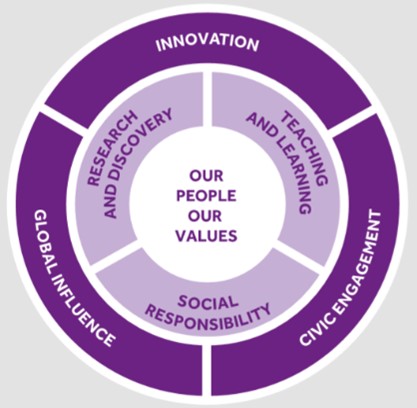
Figure 1 - Goals and Themes of Our Future
We consider our local area to operate at three levels:
1. Greater Manchester
Our main Campus is located in the ORC, a key part of the wider GM city region, home to 50% of GM’s key innovation assets, 80,000 jobs and 9,000 businesses and neighbouring some of the most deprived wards in the country. We are a founding member of the ORC Partnership which brings together stakeholders in higher education, business, health and the local authority who together have developed a shared strategy. The ORC Enterprise Zone plays a key role in attracting life sciences, ICT and advanced materials sectors to Manchester with direct access to thousands of graduates each year.
We play a central role in local public-private governance arrangements, with our Vice-Chancellor sitting on the GM Business Board (LEP) and taking an active role and acting as signatory on the GM Local Industrial Strategy. University representatives have also taken active roles on advisory boards focussing on inward investment, business growth, innovation, tourism, and notably health via Health Innovation Manchester (HInM), a devolved health and social care system which brings together academia, business and NHS to drive innovation, transforming the health and wellbeing of the citizens of GM.
We have joined leading innovators from business, academia, and local government in developing Innovation GM with the aim of creating 100,000 jobs, boosting R&D investment and growing the economy by £7bn. We have created a dedicated position of Vice President for Innovation and Civic Engagement who acts as an independent Science Advisor to Innovation GM. GM has been identified as one of the Government’s Innovation Accelerator pilot areas and we have worked with local and national public and private stakeholders to develop a shared GM Innovation Plan to develop a series of projects to increase the impact of our R&D strengths on the region.
In 2021, we launched the GM Civic University Agreement alongside the Mayor and the HEIs of GM. This agreement pledged collective action on six priority areas that were identified by a polling of 1,000 GM residents to understand what they want from their regional universities. In addition, a pioneering GM Universities’ Citizens’ Panel, composed of local people representing age, gender and ethnic profile of all ten GM authorities was setup, to understand local needs and priorities.
In Rochdale, we are working with the National Physical Laboratory and other partners on the Advanced Machinery and Productivity Institute to provide benefit to businesses through integrated digital solutions and robotic systems creating high skilled jobs across GM and West Yorkshire and drive UK industry export
2. The North West of England
We are active members of several collaborative partnerships growing the economy and prosperity of the North, including the Northern Powerhouse Partnership, the North West Business Leadership Team, and the N8 Research Partnership.
We work closely with North West partners, including:
Cheshire & Warrington where we have strong scientific and industrial partnerships, including Alderley Park and Daresbury;
Cumbria where our Dalton Nuclear Institute provides cutting-edge nuclear science capabilities and several Position Papers, which have directly impacted on Government policy and supported the key clusters operating within the region.
3. Beyond our Region
As a leading research-intensive institution, our impact and contribution to society spans far beyond our local geography. We are nationally and globally recognised for several thematic specialisms which address major societal challenges e.g. sustainability, digital transformation and health inequality. Our global reputation attracts opportunity for inward investment, supports R&D growth and contributes to positive societal impact locally, and beyond. As the host of two national institutes The Henry Royce Institute (HRI) and The Productivity Institute (PI), and flagship initiatives such as the Graphene Engineering Innovation Centre (GEIC), Manchester is recognised globally as a place to innovate, and attracts funding and investment, innovative research, and commercialisation which in turn boost the local economy, attracts international partnerships and supports jobs and growth.
Aspect 2: Activity
Our projects and programmes have their operations rooted within GM, however, their impact extends much further reaching nationally and beyond. The activities highlighted below should therefore be viewed across GM, the North West and beyond.
Linking our science base to industrial opportunities
Our ERDF and Local Growth Funded programmes support GM SMEs with the development of new processes and products to market, creating jobs and far-reaching economic and societal benefits:
£1.5m ‘Bridging the Gap’ (BtG) programme, managed by the GEIC, supports GM SMEs to develop graphene products and processes.
£10m Sustainable Materials Innovation Hub (SMIH), supports GM SMEs to develop and adopt new sustainable materials in their products.
£4.4m Research and Innovation Health Accelerator (R&IHA) supported by HInM enables GM SMEs to accelerate the commercialisation of healthcare products and services.
£6m GM Cyber Foundry (GMCF) supports GM SMEs to grow, protect their assets, and strengthen cyber defences.
£6m GM AI Foundry boosts GM SMEs performance through the use of AI as an accelerator for new products and services
In January 2021, the Christabel Pankhurst Institute was launched following a £5m Local Growth Fund award. The institute enables development of innovative products and services for the health care sector.
In 2020, the Combined Authority and ERDF provided £2m for the OPEN SME programme, which built on the capabilities of regional universities to build business skills across GM through a free to access programme.
Strengthening the innovation ecosystem
Since 2019, we have undertaken activities and invested to develop our regional innovation ecosystem including:
1. Campus Masterplan and ID Manchester
We have continued with our Campus Masterplan; a £1bn capital investment and a key element of the ORC vision to become a world-leading innovation district;
In 2021, one of the largest HE construction projects the Manchester Engineering Campus Development, was opened, which significantly enhances our ability to collaborate with manufacturing and engineering firms;
In 2022, ID Manchester initiated a £1.5bn joint venture between the University and Bruntwood SciTech. Over the next 15 years, ID Manchester aims to provide new commercial workspace, for innovative businesses looking to partner with the University and access our student talent base.
2. Business Engagement, Commercialisation and Enterprise
Business engagement, commercialisation and enterprise activities continue to be central to our strategy, we have made significant progress in supporting partnerships, commercialisation and entrepreneurship including:
The Innovation Factory (UoMIF), responsible for driving the commercialisation of innovations and IP was instrumental in facilitating the formation of our new investment vehicle, Northern Gritstone (NG). NG will deploy significant funds into spinout businesses built on IP created by the Universities of Manchester, Sheffield and Leeds.
In 2019 we relaunched, the Masood Entrepreneurship Centre (MEC) which supports staff and student entrepreneurship through sponsored venture competitions, such as Venture Further and the internationally recognised Eli and Britt Harari Enterprise Award . We have seen many start-up ventures succeed within our region and beyond.
Our business engagement services support strategic research and innovation partnerships with companies of all sizes across a range of sectors, creating impact with global significance. We work with local business leaders and sector representatives to ensure that the University supports the needs of local industry in an effective way. Over the last three years, we have developed to provide a comprehensive range of services based on business needs: (i) we occupy a leading position with Knowledge Transfer Partnerships (KTP) nationally which support growth and innovation; (ii) we hold strategic partnerships with major global corporates; (iii) we partner with GM Business Growth Hub and other regional sector agencies to help companies access our expertise and services.
3. Employment Support and Cultural Investment
Skills and employment levels in our local communities are amongst the lowest in the UK. We are helping to address this through our leadership of The Works, an innovative employment and training initiative in Moss Side and Ardwick that acts as an accessible community hub for those hard-to-reach candidates based in deprived areas. Interactions with GMCA around digital skills and the GM Local Industrial Strategy provided a strategic framework to drive skills and work activity as set out in the 2021 GM Local Skills Report and Labour Market Plan.
We have invested substantially in developing our cultural venues which create vibrancy and jobs, and last year attracted 700,000 visitors:
Since August 2021 Manchester Museum has been closed while the £15m hello future project is underway, which includes a new two-storey extension, Gallery and Exhibition Hall.
The Whitworth Art Gallery, John Rylands Library, and Jodrell Bank opened their doors again following the Pandemic, and the award-winning Bluedot festival also re-started in 2022 after a 2 year break.
In 2021, Creative Manchester became one of our three Research Platforms with a focus on Creative Industries and Innovation.
Institutes, Centres and Thematic Specialisms
We host several institutes that are internationally recognised for their thematic specialisms and our Research Beacons attract funding which has economic and societal benefit, examples include:
The HRI: Advanced materials was identified as a technology family where the UK has globally competitive advantage, and in 2019, £235m of funding opened the HRI in Manchester accelerating the development of new materials.
The PI: The £32m national institute was opened in 2020 to explore what productivity means for business, workers and communities and how it can increase living standards.
The National Graphene Institute and GEIC support early stage research through to development and scale-up of graphene and other 2D materials.
Digital Futures convenes over 1,000 researchers to address digital challenges through capabilities such as Digital Trust and Security.
Aspect 3: Results
Linking our science base to industrial needs
Since 2019, our Graphene ecosystem has delivered approximately 350 projects for 250 companies, including 49 start-ups. The support of BtG to GM SMEs has resulted in 27 new products including 6 to the market. GEIC has attracted £4.3m in project funding, £12m of VC funding and created 29 jobs.
HinM’s Annual Report showcases how our health innovation activity is meeting the needs of the region and beyond, and supports a pipeline of >80 innovation projects. The R&IHA has supported 31 GM SMEs with 4 new innovations expected to market this year.
Digital Futures has delivered ten successful projects in support of GM’s ambitions to be a leading digital city and the GMCF case studies illustrate how the programme is meeting the needs of GM SMEs.
Since 2020, the SMIH has provided over 6,000 hours of support to over 300 SMEs creating real solutions for their plastic use, policy changes, and facilitated the progression and adoption of 5 new processes and products, with a further 5 being developed through 5 collaborative projects.
Strengthening the innovation ecosystem
We have supported the impact of the ORC with an independent evaluation estimating an uplift of 3,000 jobs over 5 years with a GVA contribution of £320m p/a. The number of businesses operating in the ORC has grown by 38% since 2016, compared to growth of 21% in Manchester and 8% nationally.
From 2019 - 2022, we have had a number of successes with spin-outs and start-ups, including:
UoMIF has supported the creation of 31 new spinout companies; 4-times the number created throughout the previous 3 years. We have also generated £13.9m of new licensing income, and attracted £9.8m of first-time investment in new spinout companies with more than £80m of follow-on investment going into established UoM spinouts. Our full spinout portfolio is now estimated to employ 249 FTE.
In 2022, NG secured a first close of £215m, ready to be invested in University spinouts.
From 2019 - 2022, the MECs “Entrepreneurship for all” strategy supported the creation of 92 staff and student start-ups, and attracted £28m of investment.
Since 2019 we have developed our strategic research and innovation partnerships with local SMEs, large companies and public service institutions, including National Grid, The National Physical Laboratory, and Unilever, as well as being named lead university in the Siemens Research and Innovation Ecosystem Northern Arc.
We have consistently been ranked in the top 3 for KTPs nationally, with 75% of our current portfolio with SMEs and 61% with companies in the North West. Recent successes include an award winning KTP with AV Unibrak, an industry 4.0 inspired management information system which increased the profit margin on projects by 6%. Our SME partners have also told us how our Innovation Labs and Law and Technology Initiative are meeting their needs through accessing our multidisciplinary research.
Through our Employer Engagement Team, we have supported regional SMEs as they seek to retain graduate talent in the city. As recruiting SMEs often struggle to achieve visibility with students and graduates, we provide support with writing job descriptions to appeal to the graduate audience, raise their profile through our online careers platform, CareerConnect, and enable direct connection with students. In addition, the Manchester Graduate Talent programme has supported 1,200 SMEs recruit over 500 graduates from the university over the last 3 years.
Employment Support and Cultural Investment
Our award-winning The Works programme has positively inspired our local communities and trained approximately 800 learners from the Manchester area and supported them into jobs since 2019. The success has resulted in The Works attracting over 220 jobseekers resulting in over 77 job offers.
Our role in the ongoing creative and cultural development of the ORC is captured via Creative Manchester, particularly through the creation of many vital partnerships with city-based and UK-wide arts and cultural organisations, including UNESCO, Manchester International Festival, Contact Theatre, Manchester Literature Festival, and Carcanet Press. The John Rylands Library launched the UK first British Pop Archive featuring iconic items from the British pop culture theme. Jodrell Bank also launched the First Light Pavilion in 2022, part of a £21.5m project to open up the heritage of Jodrell Bank to more people.
Institutes, Centres and Thematic Specialisms
The HRI have set out their impacts from partnering with industry across a range of areas, including aerospace, automotive, safer nuclear power, and cancer treatment.
The PI has detailed its insights for business and policy, including The Productivity Laboratory; data-based insights for researchers policymakers and business strategists. The Institute has launched eight productivity forums and published Regional Productivity Insights Papers to provide a framework for its work across the UK.
Communicating performance
We communicate the progress of our local growth and regeneration KPIs in research, teaching and social responsibility, via our annual Stocktake Report, which also includes measures on reputation to ensure we understand what our external stakeholders think of our performance. We communicate our performance against all 17 of the Sustainable Development Goals. Through our Policy@Manchester platform and the GM Policy Hub we engage with a wide group of policymakers in our local areas across the full breadth of our research and innovation, and local growth agenda.
Public & Community Engagement
Summary of approach
Purposeful public engagement is essential to realising our strategic core goals - research, teaching and social responsibility. By
sharing, listening and partnering with diverse communities we can co-create knowledge and learning to embed a culture of inclusive, innovative and high-quality engagement practice across all areas of our work, making a positive social and environmental impact. We’re recognised locally, nationally and internationally for our approaches to public and civic engagement, which is enabled through our commitment to people, place and partnerships. Our engagement approach is integrated in our research including - participatory research and policy engagement, in our teaching including - service learning and widening participation, and in our social responsibility including - cultural engagement and volunteering.
Aspect 1: Strategy
Public engagement features prominently in our strategic plan Our Future. Supported by our unique goal of Social Responsibility it is embedded across all our work through our accompanying Social Responsibility and Civic Engagement (SRCE) strategic plan which has five priorities.
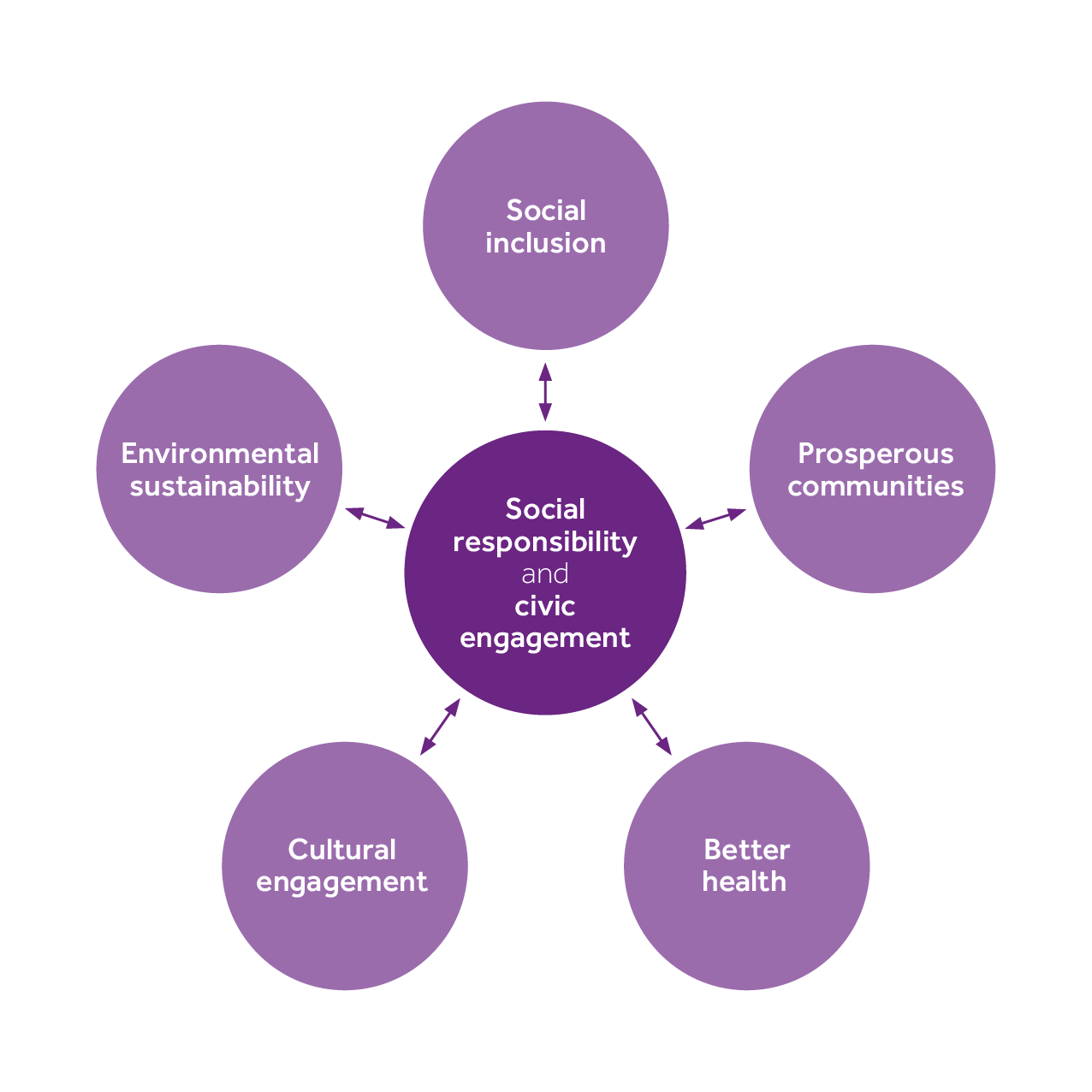
Building on this, our institutional Public Engagement Framework positions our role as a university that enables purposeful, inclusive and collaborative engagement. This Framework was developed with staff, students and partners and will be supplemented with an action plan alongside the current renewal of our Engage Gold Watermark.
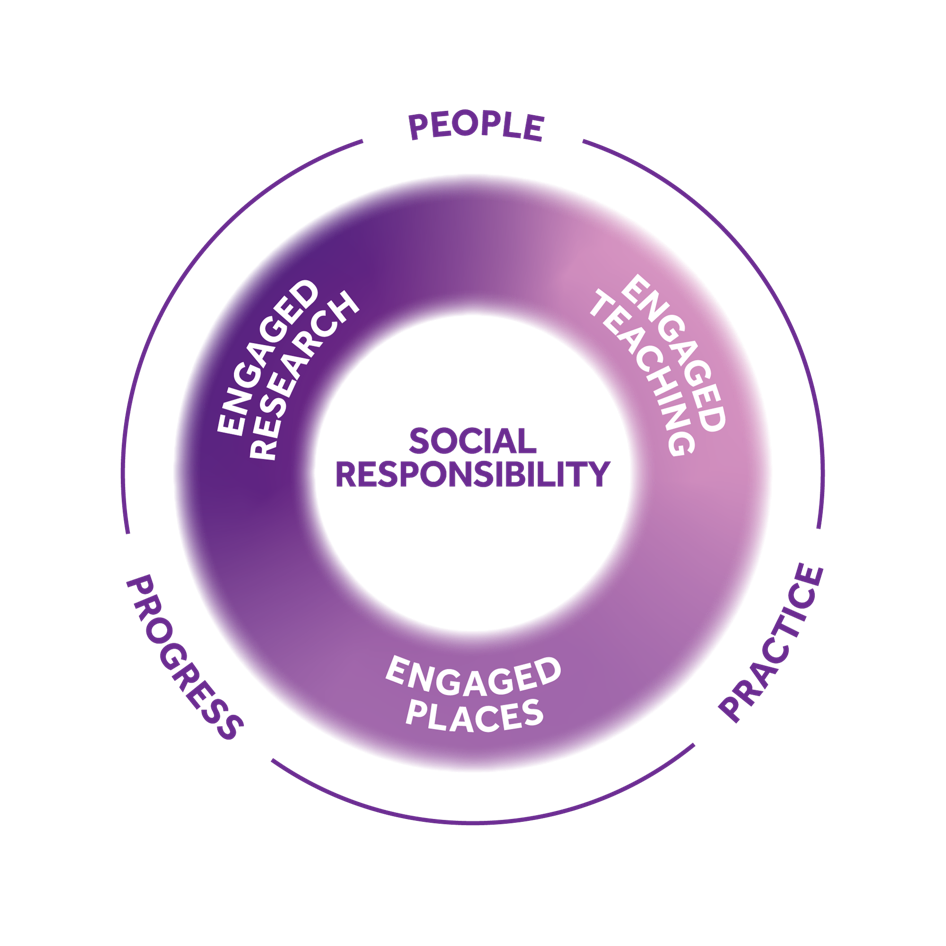
Our SRCE priorities tackle equality, diversity and inclusion (EDI) challenges in research, teaching and cultural activities. Supported by our EDI strategy we foster inclusive environments, cultures and practices to enhance diversity and equity across our communities.
Our engagement work identifies and prioritises diverse publics based on interest, place and identity. Our Greater Manchester Civic University Agreement (GMCUA) – bringing together the five universities in Greater Manchester with the Greater Manchester Combined Authority (GMCA) around shared civic engagement priorities – polled 1,000 local residents to ask what they valued and wanted from their universities. We’ve also invested in a Greater Manchester Universities’ Citizens’ Panel and Principal Partnership with Citizens UK – ensuring we listen and shape priorities around real needs. This builds on sustained investment in initiatives such as the University Ardwick Partnership CIC, which is co-directed by community members and instrumental in shaping our community engagement and research priorities in the local area.
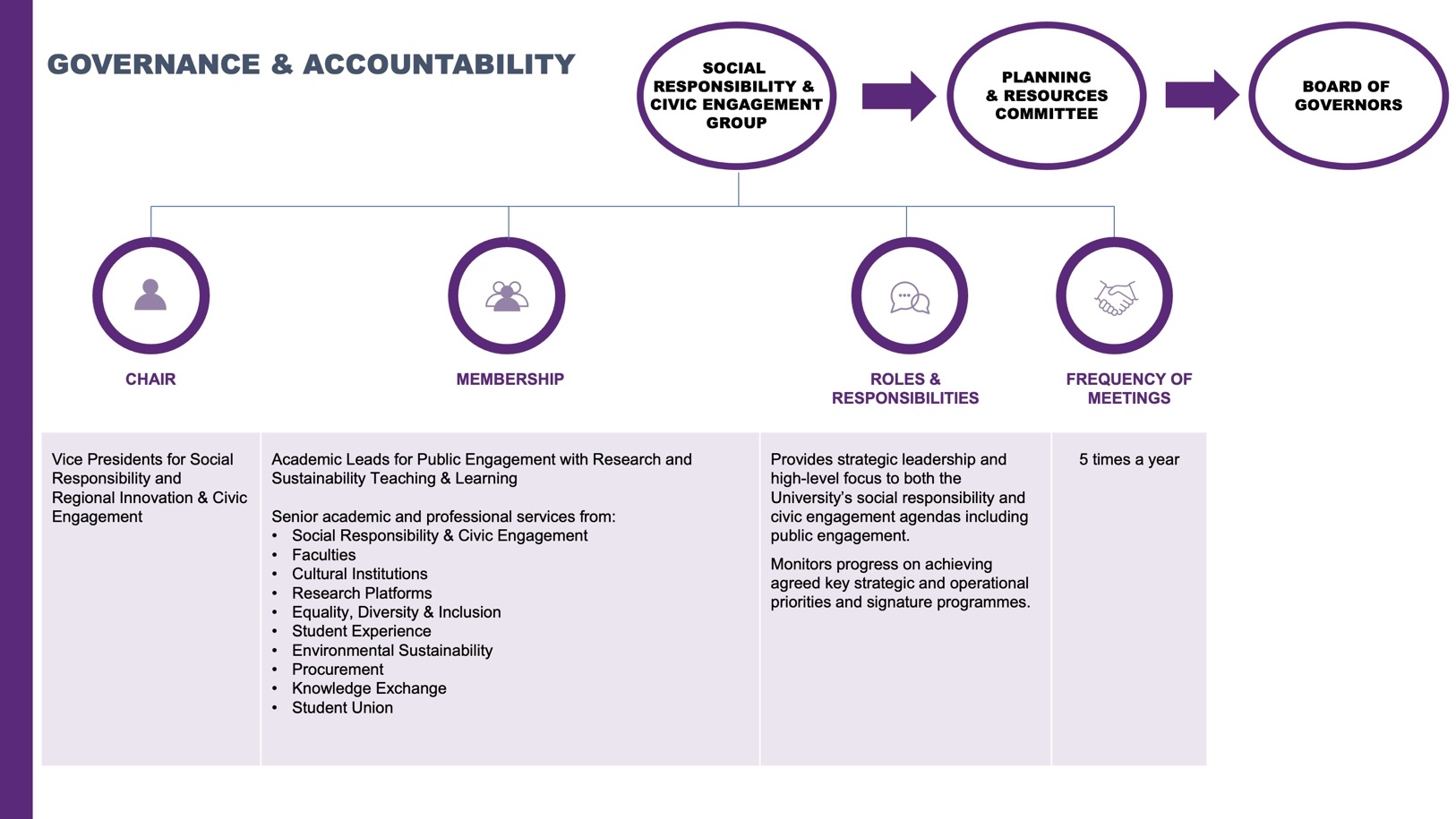
Public engagement is one of four key ways we approach SRCE in our plan and is governed through our SRCE Group, co-chaired by the Vice-President for Social Responsibility and the Vice-President for Regional Innovation and Civic Engagement (both members of our Senior Leadership Team (SLT) and reporting to our President and Vice Chancellor).
Academic Leads for Public Engagement with Research and for Sustainability Teaching and Learning have additional responsibilities for developing strategy and direction for public engagement.
Public engagement is part of our three Faculty Vice-Dean for Social Responsibility’s responsibilities. Each sit on their Faculty SLTs and have additional Academic Leads for SRCE at School/Division level.
We formally involve the public in core governance and advisory roles, e.g. via our: University Ardwick Partnership CIC; Public and Patient Involvement and Engagement Forum, co-chaired with public contributors; Board of Governors; General Assembly; and numerous ethics, research and culture advisory forums, including Manchester Museum’s Shared Cultural Heritage (OSCH) programme working with young people from the South Asian diaspora.
We fund public engagement through a relatively small core of central activity alongside a substantial investment of c£6M per annum in pay and non-pay costs across our faculties, four cultural institutions, our policy and creative research platforms, student volunteering, and academic staff time. In 2020/21 we also invested £2.9M from internal sources on capital expenditure for our cultural institutions to enhance our public engagement capacity.
Aspect 2: Support
The Office for Social Responsibility leads on public engagement in collaboration with faculties, key departments and our cultural institutions. This devolved structure enables us to embed a culture of engagement and deliver a comprehensive programme of practical support and opportunities.
We have c80 FTE staff dedicated to public engagement management, coordination and delivery with responsibility embedded across all key areas of university activity.
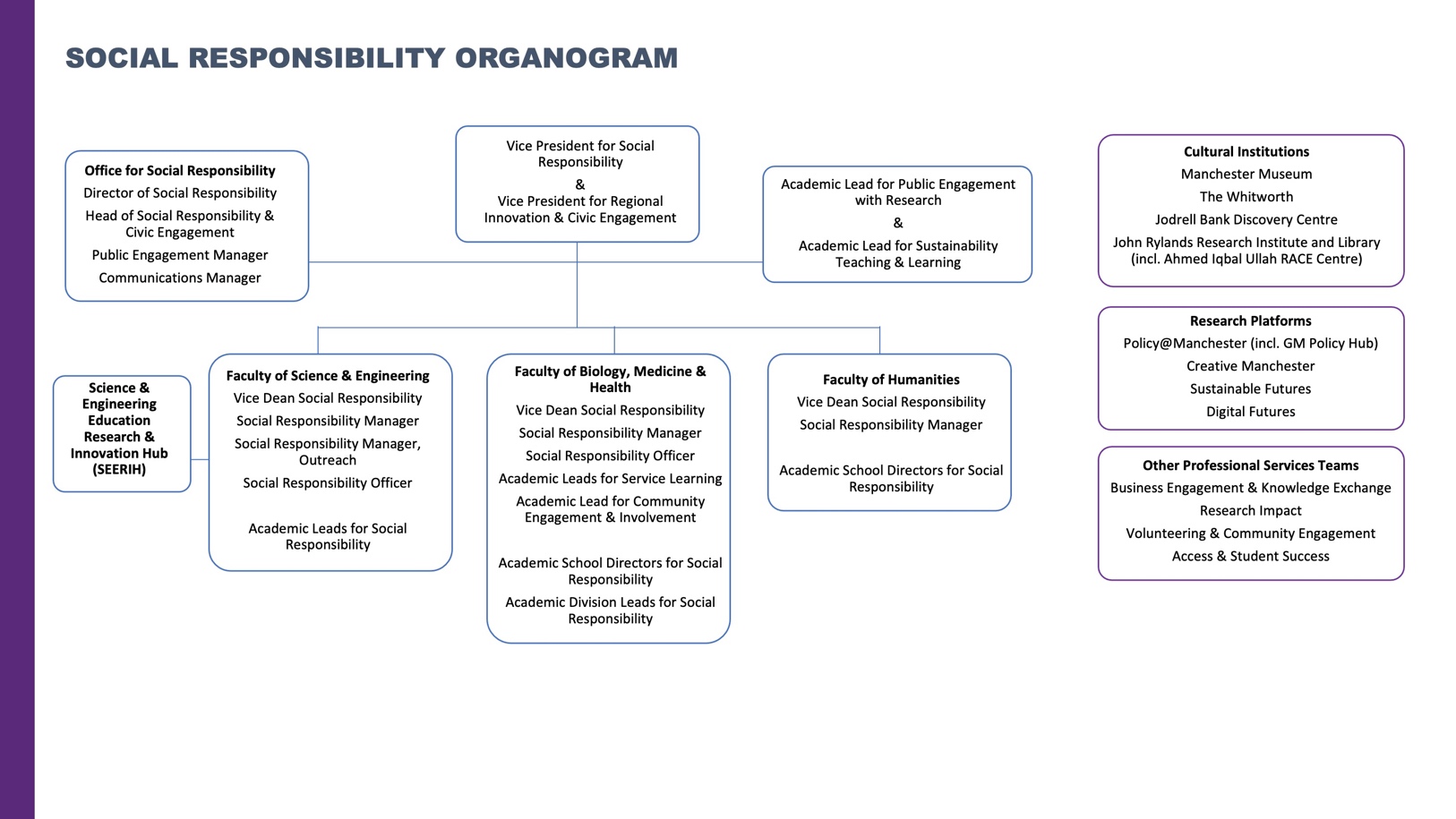
We invest core university funds in social responsibility, public engagement and civic engagement, with most staff employed on permanent contracts, including dedicated staff in central, faculty and research platforms departments. We also fund staff and running costs associated with our world-leading cultural institutions – Manchester Museum, the Whitworth, John Rylands Research Institute and Library and Jodrell Bank Discovery Centre.
Workload for academic staff includes explicit recognition and workload allocation. Dedicated academic roles have been created for key academics to support social responsibility. Social responsibility (and thus public engagement) is embedded in academic promotions and exceptional performance criteria rewards. Student work is recognised through Stellify. We celebrate the impact staff, students and partners have on society through our annual University-wide Making a Difference Awards and Volunteer of the Year Awards and faculty schemes e.g. Better World Awards.
Practical support for public engagement includes:
Professional development such as our Public Engagement Champions scheme, Public and Patient Involvement Toolkit, policy and cultural institution toolkits, and a Public Contributor induction and training programme.
Advice surgeries provided by central and faculty services on public engagement, civic engagement, research impact and knowledge exchange.
Networks bringing colleagues and external partners together to foster good practice.
Profiling the diversity of public engagement practice through our website and #OurEngagingPeople campaign.
Funding through impact accelerators, ISSF Wellcome funding, CAPE seed funding for policy engagement, and Faculty funds for social responsibility, public and civic engagement (typically c£500,000 p/a).
Connecting staff and students to external public engagement opportunities and investing in our annual events such as bluedot, Great Science Share for Schools, Community Festival and ScienceX to enhance practice and engage with multiple public groups.
Public engagement through our research platforms – Creative Manchester, Sustainable Futures, Digital Futures – to foster partnerships and deliver impact activities linked to research.
Policy@Manchester and the GM Policy Hub connect academics with policymakers to address regional policy agendas and optimise collaborative opportunities.
Digital channels support different public groups to get involved in our research, teaching and culture activities, e.g. Public Contributors, University Living Labs, Social Responsibility, the Whitworth, Manchester Museum, Justice Hub, Volunteer Hub and University public events.
Through our EDI strategy and SRCE activities we’re also:
Working collaboratively with underrepresented communities to shape research, teaching and culture activities, e.g., through our Manchester Urban Ageing Research Group; Humanising Dentistry service learning, and South Asia Gallery Collective;
Piloting new approaches to partnerships and deliberative listening through our Greater Manchester Universities’ Citizens’ Panel;
Supporting teachers and cultural sector leaders to be social justice researchers in how they address poverty and disadvantaged communities through Local Matters: a programme to tackle inequality
Improve research innovation practices and culture through our Inclusive Research Transformation Programme;
Enhancing our training provision on inclusive public engagement practice (sessions are BSL interpreted).
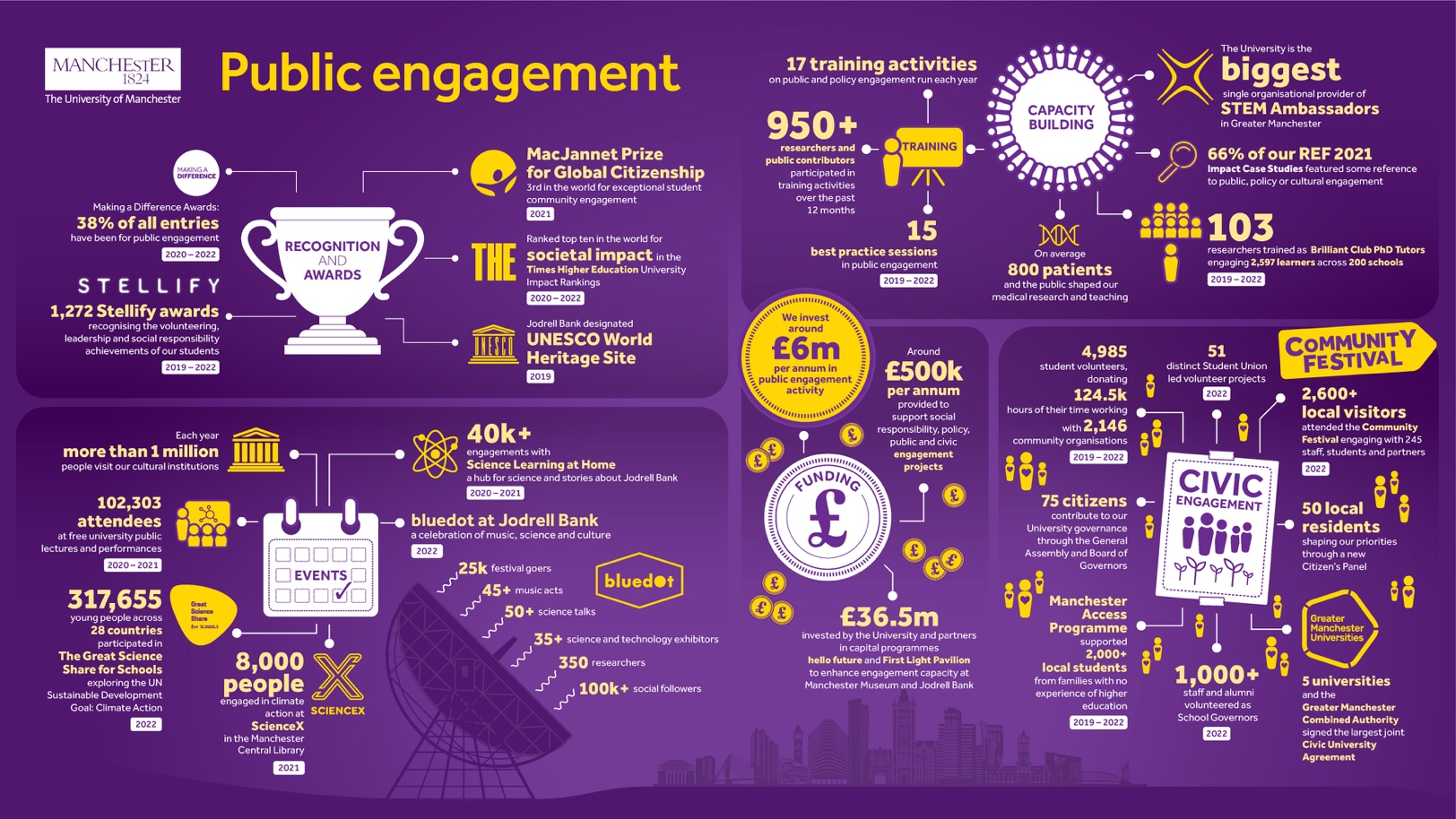
Aspect 3: Activity
Our breadth of public engagement is as diverse as the communities we engage with. Approaches most appropriate for their intended purpose and context are used. Our UN Sustainable Development Goals microsite and Our Engagement Stories illustrate how our research, teaching and public engagement address challenges locally, nationally and globally and how our practice of involving and partnering with diverse communities is making an impact, e.g., through our Community Festival; #Beewell; Britain Breathing; and In Place of War initiatives.
Some local, national and international examples of activity:
Local: Developing community co-researchers to investigate air quality, health and wellbeing in Brunswick in Ardwick.
This place-based participative project arose from resident-led concerns over air quality in a previous collaboration with the University, local housing association and community feedback. Like many low-income areas, Brunswick is disproportionately affected by poor air quality and this project worked in partnership with communities to find inclusive ways of responding to this. The project used creative practice to identify strategic priorities for air quality, provided training, equipment and support to empower community researchers to conduct research and shared evidence and learning with policy makers. The project has led to further collaborations with the community-led Ardwick Climate Action group. The policy blogs (1) and (2), case study and evaluation report highlight the importance of working to a shared need, sustaining long-term relationships and a strong place connection. The project sits within our SRCE priorities for social inclusion, better health, environmental sustainability, and prosperous communities and exemplifies our commitment to civic engagement and community partnerships.
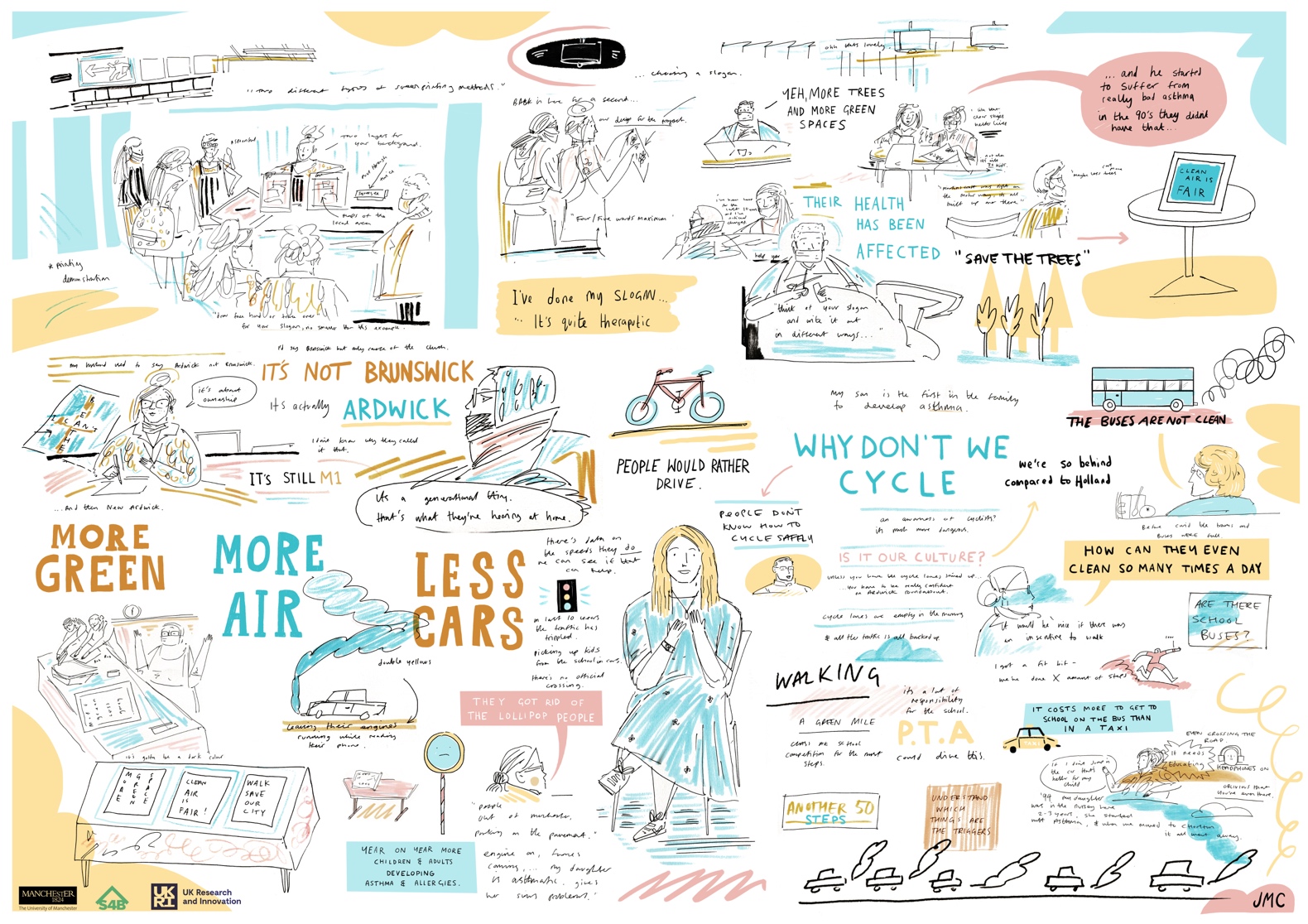
National: NHS Voices of Covid-19
This participative research programme developed a national oral history collection of personal stories around Britain’s most cherished institution – the NHS – and specifically its response during the Covid-19 pandemic. Over 150 volunteers were trained as co-researchers undertaking 2,800 interviews to document the place of the NHS in everyday life and work, providing a globally-significant oral history of our times. This captured the complex social dimensions of the pandemic and helped to develop policy briefings informing practice and influencing changes in health policy. The archive is maintained in partnership with the British Library. The project film and evaluation report explore project processes, outputs and outcomes to inform future approaches for similar participative oral history projects. A key finding was how the project provided co-researchers with a greater sense of wellbeing, belonging and value. The project sits within SRCE priorities for social inclusion, better health and cultural engagement and exemplifies our commitment to working in partnership with public contributors.
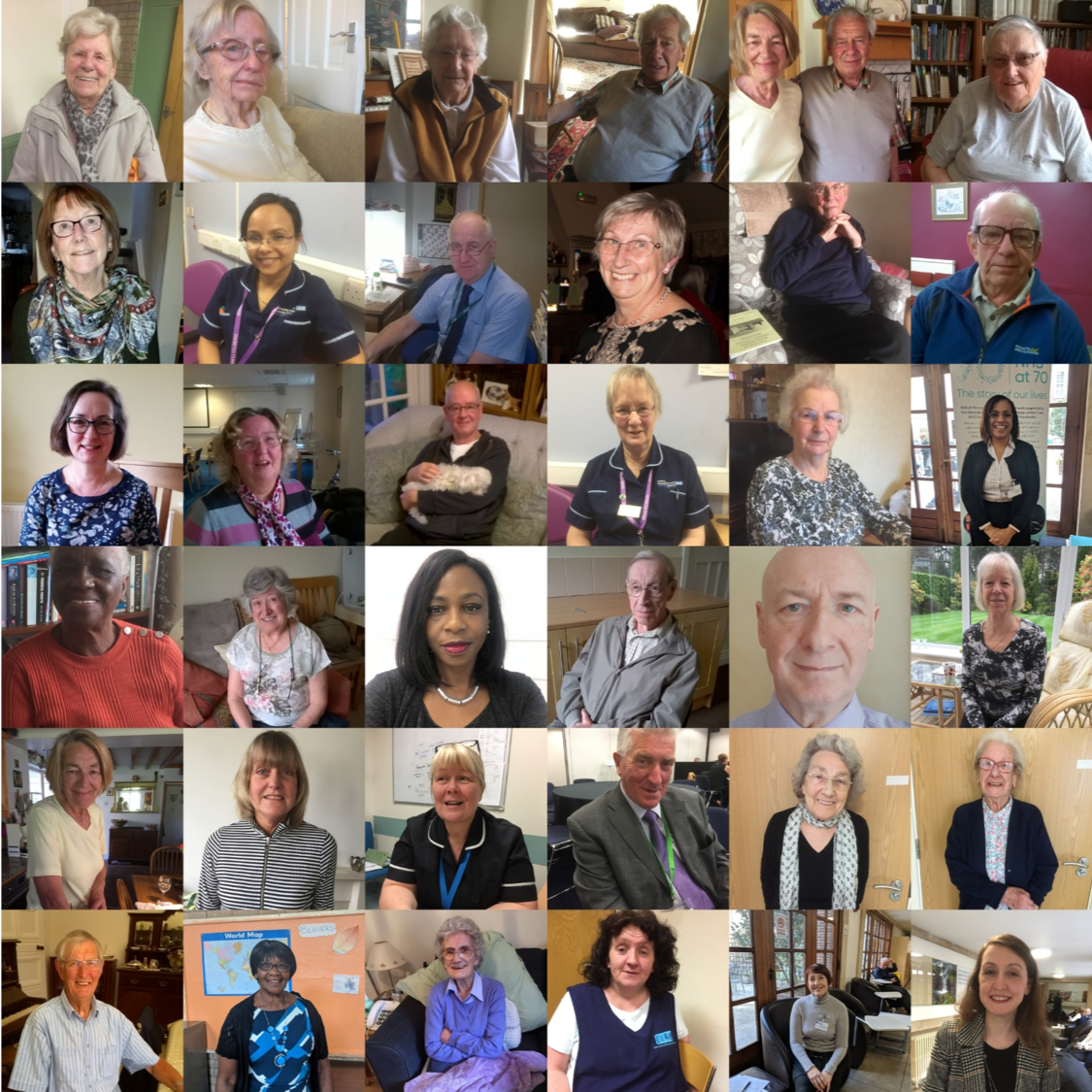
International: Great Science Share for Schools (GSS4S)
GSS4S is our international programme to develop scientific literacy and confidence. In 2022 it involved 317,655 learners in 28 countries with science and engineering questions. The initiative adopts a child-led approach, with pupils designing their own scientific questions and investigations and sharing these as public engagement practitioners back into their own communities and educational contexts. It has led to further partnership work e.g. with the Royal Society’s Great Science Share Clean Air Challenge. Our evaluation demonstrates the impact on children’s learning in science and pupil outcomes. The project sits within SRCE priorities for social inclusion and the UN SDGs and exemplifies our commitment to public involvement, science capital and partnership working.
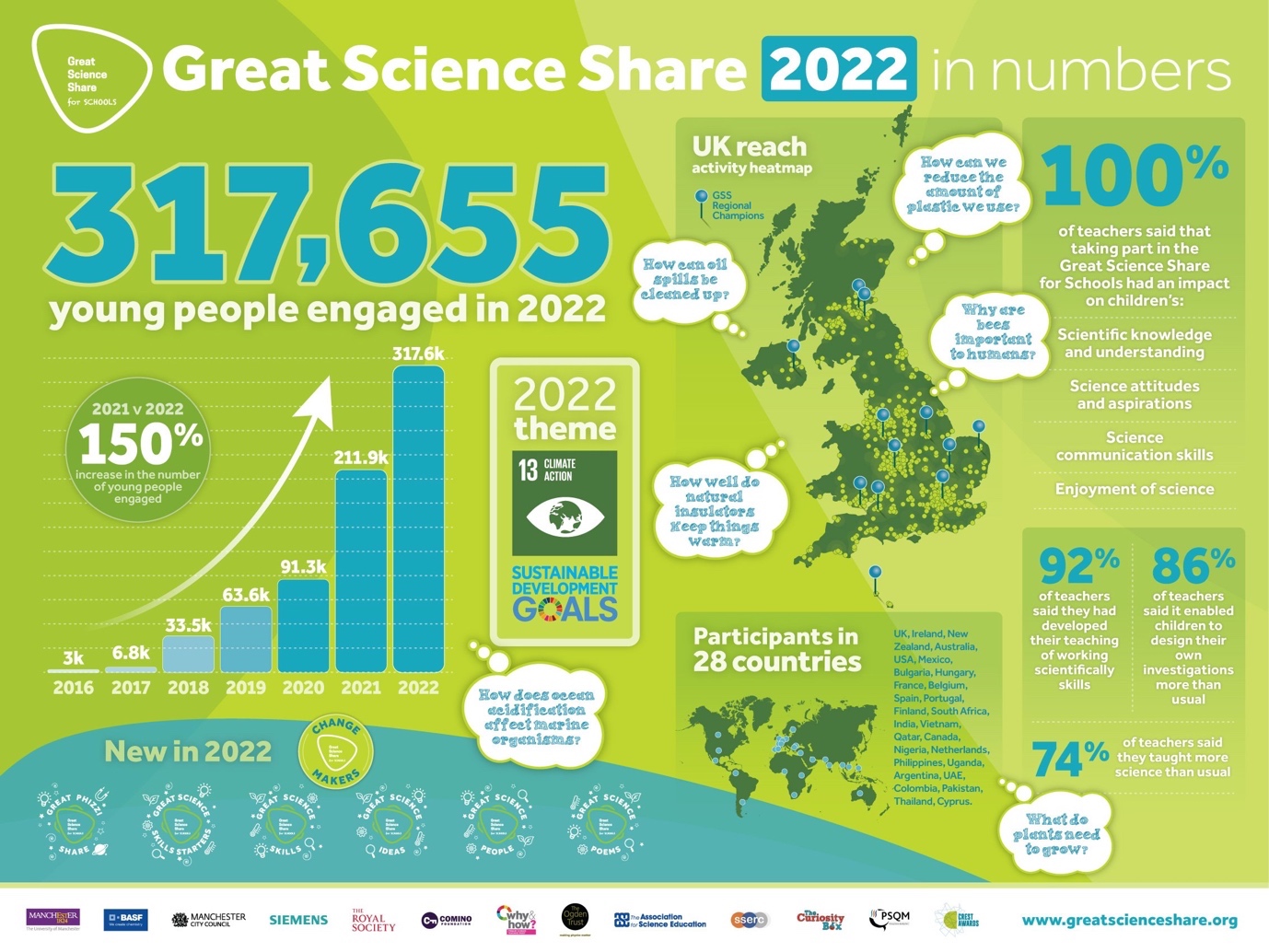
Aspect 4: Enhancing practice
As one of the UK’s largest universities with four cultural institutions, there are a diverse range of ways that public and civic engagement activity is evaluated. We’re committed to developing a culture of evaluation practice across our research, teaching and wider social responsibility activities, including through our cultural institutions.
This is supported through university-wide initiatives including:
Providing five annual evaluation and evidencing-impact training courses using a theory of change model and advice surgeries to enhance evaluation practice and confidence of individuals and teams across the university that is delivered by teams across the university (e.g. social responsibility, research impact, teaching and widening participation).
Four years of sustained evaluation of our university-wide Community Festival, which is methodologically designed to understand whether we meet our strategic objectives to respond to our most local neighbours, supporting a culture of meaningful connections between staff, students and the public, and provide opportunities for staff and students to enhance their public engagement skills.
Core public and civic engagement projects funded by Faculties across the University are required to submit evaluation plans.
Funding the commissioning of specialist evaluation support for high-impact case studies for REF2021 e.g. Report of long-term impact of ESOL classes for the Improved Infection Awareness, Prevention and Treatment in Hard-to-Reach Groups and participative research projects such as Local Matters which offer shared learning about approaches to co-production.
Evaluating training initiatives such as the Patient and Public Involvement and Engagement Induction and Training Programme and Public Engagement Champions programme to inform and enhance future provision.
Sharing learning through case studies and best practice sessions via internal and external networks e.g. NCCPE and AAAS.
Our SRCE plan details our commitment to the 17 UN SDGs as a framework for impact. We communicate research, learning and students, public engagement and university operations outcomes through our annual SDG Report and evaluate progress via the Times Higher Education Impact Rankings (featuring 1st, 3rd, 8th, 9th in world since inception).
Standardised HE-BCI monitoring data on the volume of public engagement outputs/attendees and academic inputs of time.
Evaluating our pioneering Service Learning approach in healthcare through assessment by the international Talloires Network’s MacJannet Prize, which placed us third in the world using their framework for excellence in student-led public engagement.
Our internationally-significant science engagement centre – the Jodrell Bank Discovery Centre – received designation as UNESCO World Heritage Site in part due to its ability to inspire and engage scientists of the future.
Aspect 5: Building on success
Following consultation with staff, students, and external stakeholders in 2020 we launched our institutional strategy Our Future (2020-2025) with seven key themes. These included affirming our commitment to social responsibility (where public engagement sits) and civic engagement. We embedded measures for public engagement as part of Our Future’s eight university-wide KPIs monitored by our Board through Annual Performance Reviews. Here we set out to:
perform in the highest, top quintile in UKRI/Research England’s KEF perspective for Public and Community Engagement.
perform in the top 2% of universities globally for impact in the THE Impact Rankings which includes our commitment to public engagement across all 17 SDGs.
These ambitions have been achieved and we communicate these at the highest level internally through our Board scorecard and externally in corporate reports.
In developing our Public Engagement Framework we continued to use the NCCPE EDGE Tool to assess and benchmark our support for engagement.
Combined, these processes have resulted in a range of strategic initiatives to develop our work in response to feedback, including:
enhancing public engagement capacity through our Manchester Museum hello future and Jodrell Bank First Pavilion Light project.
listening to the views of 1,000 citizens across Greater Manchester
new academic and professional appointments for public and civic engagement;
a Service Learning framework and academic leads;
a new GM Policy Hub;
strengthening academic promotions criteria;
piloting a public engagement champion programme;
a toolkit and charter for public and patient involvement.
Internally, our SRCE Group now uses a tracker linked to its plan. Our established strategic planning process ensures engagement is cascaded through faculty strategies, operational priorities and annual performance review e.g., the PPIE Forum Action Plan. Our Making a Difference Awards for staff, students and partners provide an annual opportunity to share and reflect on our practices and impact on wider society through a range of awards for excellence in public engagement.
Externally, we’ve ensured progress in public engagement is submitted to external scrutiny and the highest levels of evaluation and involvement. E.g.:
Regionally: after listening to 1,000 citizens’ view across GM we worked with Manchester Evening News on a Greater Manchester Graduates campaign. We’ve involved and consulted with the public our biennial stakeholder survey, General Assembly, PPIE Forum, independent polling and a GM Universities’ Citizens’ Panel to seek feedback and understand needs and priorities.
Nationally: proactive engagement with the NCCPE Engage Watermark process reinforces our ambition to continuously improve, e.g. our action plan has strengthened leadership and improved the diversity of our partnerships. We’re active partners in the national Civic University Network. We've led health and ageing work through a Creative Ageing Development Agency, founding Board member status with the Culture, Health and Wellbeing Alliance and through extensive engagement with the Independent SAGE.
Internationally: We listen, learn from and share excellent practice in public engagement globally through being a founding member of the University Social Responsibility Network (USRN); an Engaged Member of the Talloires Network; the only UK University in the US Anchor Institution Task Force (AITF); and through active involvement with the American Association for the Advancement of Science (AAAS). We use global benchmarks and quality processes to feed back into our continuous development, e.g., we participate in and report on our performance in the Times Higher Education Impact Rankings based on all 17 of the UN Sustainable Development Goals to shape our work on wider social responsibility and public engagement practices.
Note You are currently viewing the latest version of this narrative statement. View the previous version as published in previous iterations of the KEF (KEF1 and KEF2)